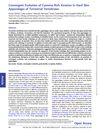 March 2021 in “bioRxiv (Cold Spring Harbor Laboratory)”
March 2021 in “bioRxiv (Cold Spring Harbor Laboratory)” Removing a specific gene in certain skin cells causes hair loss on the body by disrupting normal hair development.
 1 citations,
January 2023 in “Burns and trauma”
1 citations,
January 2023 in “Burns and trauma” Tiny particles from 3D-grown skin cells speed up wound healing by promoting blood vessel growth.
 13 citations,
January 2020 in “Neuroscience”
13 citations,
January 2020 in “Neuroscience” Blocking 5α-reductase can harm memory and brain structure, and increase harmful brain changes in male mice used for Alzheimer's disease research.
 18 citations,
October 2017 in “Drug Design Development and Therapy”
18 citations,
October 2017 in “Drug Design Development and Therapy” DA-9401 helps protect rat testis from finasteride damage.
 13 citations,
December 2017 in “CNS Neuroscience & Therapeutics”
13 citations,
December 2017 in “CNS Neuroscience & Therapeutics” Finasteride affects young male rats' brain function and behavior negatively.

Thermal spring waters and their microbes could be good for skin health and treating some skin conditions in skincare products.
24 citations,
January 2018 in “Development” Frizzled 3 and Frizzled 6 together control the orientation of mouse hair follicles.
 September 2020 in “Research Square (Research Square)”
September 2020 in “Research Square (Research Square)” Certain genes influence immunoglobulin levels in Chinese Holstein cows, which can improve calf health.
 46 citations,
August 2019 in “Journal of Ethnopharmacology”
46 citations,
August 2019 in “Journal of Ethnopharmacology” Eclipta prostrata has many traditional uses and health benefits, but more research is needed to understand how it works and ensure it's safe.
 17 citations,
February 2019 in “Journal of steroid biochemistry and molecular biology/The Journal of steroid biochemistry and molecular biology”
17 citations,
February 2019 in “Journal of steroid biochemistry and molecular biology/The Journal of steroid biochemistry and molecular biology” AKR1D1 controls glucocorticoid levels and receptor activity in liver cells.
 January 2022 in “IntechOpen eBooks”
January 2022 in “IntechOpen eBooks” Some lesser-known causes of PCOS include autoimmune issues, genetic mutations, and changes in the body's microbiome.

Glycyrrhizic acid and licorice extract can significantly reduce unwanted hair growth.
70 citations,
January 2014 in “International review of cell and molecular biology” Keratin proteins are crucial for healthy skin, but mutations can cause skin disorders with no effective treatments yet.
 1 citations,
October 2022 in “Annals of Translational Medicine”
1 citations,
October 2022 in “Annals of Translational Medicine” Cucurbitacin helps mice grow hair by blocking a protein that stops hair growth.
 January 2024 in “GeroScience”
January 2024 in “GeroScience” Using radiation to make mice's hair turn gray helps study and find ways to prevent or reverse hair graying.
 2 citations,
June 2022 in “Molecules”
2 citations,
June 2022 in “Molecules” Connarus semidecandrus Jack extract promotes hair growth and thickness, reduces prostate cancer cell growth, and could potentially be used as a treatment for hair loss.
 36 citations,
November 2019 in “Molecular biology and evolution”
36 citations,
November 2019 in “Molecular biology and evolution” Cysteine-rich keratins evolved independently in mammals, reptiles, and birds for hard skin structures like hair, claws, and feathers.
 2 citations,
June 2023 in “Journal of cell science”
2 citations,
June 2023 in “Journal of cell science” Mutations in iRhom2 affect hair and skin in mice and are linked to esophageal cancer, with ADAM17 playing a crucial role.
 24 citations,
May 2019 in “PLOS genetics”
24 citations,
May 2019 in “PLOS genetics” Mutations in the HEPHL1 gene cause abnormal hair and cognitive issues.
 43 citations,
August 2018 in “Cell Stem Cell”
43 citations,
August 2018 in “Cell Stem Cell” Hoxc genes control hair growth through Wnt signaling.
 18 citations,
September 2018 in “Experimental physiology”
18 citations,
September 2018 in “Experimental physiology” Electro-acupuncture may help treat PCOS in rats by changing brain DNA methylation.
 59 citations,
May 2017 in “Scientific reports”
59 citations,
May 2017 in “Scientific reports” ZDHHC13 is important for normal liver function and metabolism, affecting mitochondrial activity.
5 citations,
March 2017 in “Gene” CAP1 decreases the expression of a hair-related protein in young Tan sheep's skin.
128 citations,
August 2020 in “Cell stem cell” Dermal fibroblasts have adjustable roles in wound healing, with specific cells promoting regeneration or scar formation.
 1 citations,
August 2023 in “Frontiers in immunology”
1 citations,
August 2023 in “Frontiers in immunology” Traditional Chinese medicinal foods may help manage long-term post-COVID symptoms.
February 2023 in “Frontiers in Pharmacology” Water extract of Cacumen Platycladi helps hair growth by activating specific cell pathways.
 1 citations,
November 2023 in “Naunyn-Schmiedeberg's archives of pharmacology”
1 citations,
November 2023 in “Naunyn-Schmiedeberg's archives of pharmacology” Henna has potential health benefits and can treat various conditions, but more research is needed to confirm safety and effectiveness.
 39 citations,
January 2019 in “Cells”
39 citations,
January 2019 in “Cells” Gene therapy has potential as a future treatment for Hutchinson-Gilford progeria syndrome.
119 citations,
November 2016 in “American journal of human genetics” Mutations in three genes cause Uncombable Hair Syndrome, leading to frizzy hair that can't be combed flat.
182 citations,
November 2018 in “Cosmetics” Seaweeds have beneficial compounds for skin care, including anti-aging and protective effects.






















